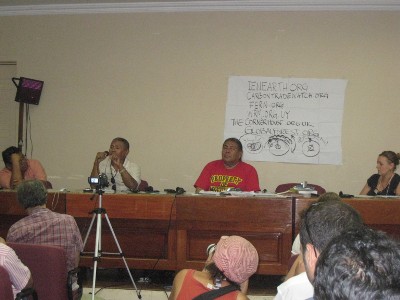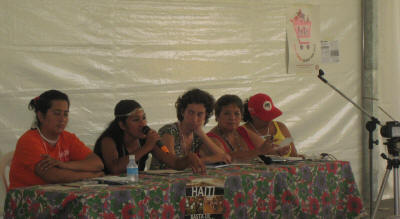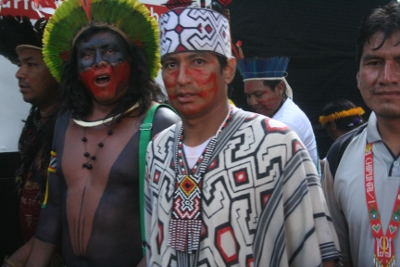Climate Justice Now!
Climate Change is big business. Literally! Many corporations, including some of the worst polluters, are salivating at the prospects of potentially vast sums of money that could very well come their way in the name of saving the planet. Climate justice activists, including indigenous peoples, are rightly worried that in the rush to “save the planet” governments and international institutions (including the World Bank, for example) will once again put profits before people.
Photo courtesy of Sandra Yu, Detroiters for Environmental Justice
The Copenhagen Climate Summit – also known as the “COP 15” – convened by the United Nations at the end of this year is yet another venue in which indigenous peoples and climate justice activists are concerned their voices will remain unheard. And so they are strategizing to prevent that from happening. But already, we’re hearing reports of how some climate and environmental justice organizations are being refused funding by foundations and government aid agencies because of their opposition to, or skepticism of, REDD – Reducing Emissions from Deforestation and Forest Degradation. Their opposition is based on genuine concerns about market-based schemes like carbon trading that more often rewards polluters and raises important questions about indigenous sovereignty.
At the World Social Forum in Belém, Brazil, many indigenous peoples and climate justice activists came to strategize and to ensure that their concerns and ideas would be on the COP 15 table. Throughout the week, organizations from Latin America, Asia, Africa, Europe and North America met to hear testimony, discuss their positions and chalk out plans. As people most directly impacted by climate change, they realize more so than most the urgency of the situation. As Tony James, of the Amerindian Peoples Association of Guyana noted during a workshop convened by Tom Goldtooth of the Indigenous Environmental Network, “The ants [in the forest] are confused right now. And if those little things are confused, we don’t have time.”

On January 29th I spent the day at the WSF at the Multipurpose Tent III at the Universidade Federal Rural da Amazônia listening to representatives of Grassroots’ partners, the Via Campesina and the Brazilian Landless Workers Movement. Also present were others such as Focus on the Global South (Asia), Oilwatch Nigeria, and organizations that came together during the Bali 2007 summit as the Climate Justice Now! Coalition, including groups such as the Durban Group for Climate Justice and Carbon Trade Watch.

At the end of the week the movements and organizations within the Climate Justice Assembly released their declaration as part of the Assembly of Assemblies closing session of the Belém World Social Forum.

